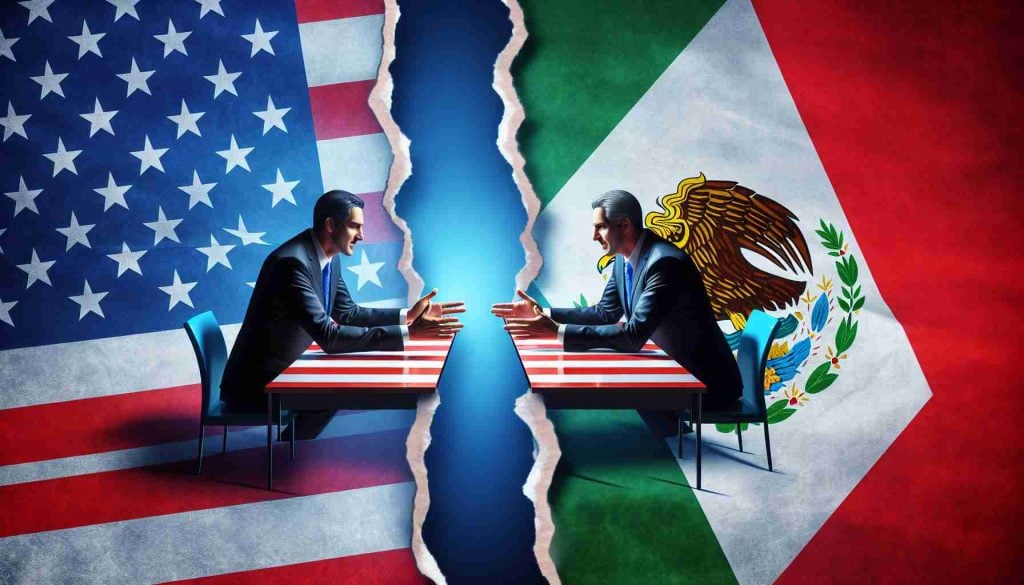- The U.S.-Mexico trade relationship involves nearly 15,000 trucks and nearly a billion dollars in daily trade.
- This partnership, thriving for over 30 years, is deeply rooted in economic, cultural, and familial ties.
- President Trump’s proposed tariffs of 25% on Mexican goods raise concerns about the stability of this relationship.
- The drive to limit illegal immigration and fentanyl influx could heavily impact trade ties.
- Disruption of this economic partnership may have significant repercussions for families, communities, and markets in both nations.
In a bustling border town, the heartbeat of U.S.-Mexico trade echoes with the sound of nearly 15,000 trucks rolling through Laredo, Texas every day. Once merely a flicker of commerce, the relationship has exploded into a near billion-dollar daily trade, weaving the economies of the two nations into a fascinating tapestry of interdependence. This is a story of both triumph and tension, where deep economic ties thrived for over 30 years under free trade agreements.
Yet, as President Trump prepares to impose 25 percent tariffs on Mexican goods, a storm brews on the horizon. With a focus on curtailing illegal immigration and curbing the inflow of fentanyl, the administration threatens to shake the very foundations of this partnership. Compounding the matter, Trump’s contention with trade competition from Mexico echoes through American factories, raising the alarm for U.S. workers.
Despite the impending tariffs, many business leaders stress that the bonds connecting the U.S. and Mexico reach far beyond trade figures. This relationship, rich with shared cultural, familial, and economic ties, carries profound implications. As political winds shift and tariffs loom, the question arises: could these actions sever the sinews of commerce we’ve come to rely on?
The takeaway? The U.S.-Mexico connection is not just powerful; it’s essential. Disrupting it could unleash painful consequences that ripple across families, communities, and markets on both sides of the border. As we brace for change, understanding this intricate web of interdependence becomes more crucial than ever.
Unpacking the Future of U.S.-Mexico Trade: Opportunities and Challenges Ahead
# The Impact of Tariffs on U.S.-Mexico Trade Relations
In the heart of U.S.-Mexico trade, Laredo, Texas stands as a gateway where nearly 15,000 trucks traverse each day, representing a multi-billion-dollar daily exchange between the two nations. The interdependence forged over three decades through various free trade agreements is remarkable, yet it faces a critical test amidst current political tensions.
Innovations in Trade Practices
As we navigate potential tariff changes, new innovations are surfacing in trade practices. Enhanced technologies such as blockchain for supply chain transparency and real-time shipment tracking are being integrated to mitigate the impact of increased tariffs. These developments aim to streamline operations and reduce costs for businesses potentially affected by the impending tariff policies.
Sustainability Efforts in Trade
Furthermore, sustainability is becoming a crucial factor in cross-border trade. Companies are increasingly focusing on eco-friendly practices, such as reducing carbon footprints associated with logistics and prioritizing local sourcing where possible. This trend not only helps in compliance with evolving regulations but also resonates with consumers who prioritize sustainability.
Market Forecasts and Future Insights
The potential implementation of tariffs could significantly alter the landscape of trade. Analysts predict varied outcomes based on sectoral impacts; for example, industries heavily reliant on imports from Mexico, like automotive and agricultural products, may face increased costs. Conversely, some U.S. manufacturers may benefit from reduced competition.
Key Questions Addressed
1. How will U.S.-Mexico tariffs affect consumer prices?
Tariffs are likely to lead to increased prices for goods that rely on imports from Mexico, such as electronics and agricultural products. This could lead to inflation in these categories and ultimately affect consumer spending.
2. What are the implications for small businesses engaged in U.S.-Mexico trade?
Small businesses may struggle to absorb the costs of tariffs, leading to reduced margins or passing costs onto consumers. Many might seek alternative sourcing or adjust their supply chains, which could require re-evaluating business strategies.
3. What role does the supply chain’s resilience play in current trade dynamics?
Resilience in supply chains is crucial as businesses adapt to evolving geopolitical landscapes. Companies are increasingly diversifying suppliers and optimizing logistics to reduce dependency on single sources—an approach that mitigates risks associated with tariffs or trade disputes.
Suggested Links
For deeper insights into U.S.-Mexico trade relations, visit trade.gov.
